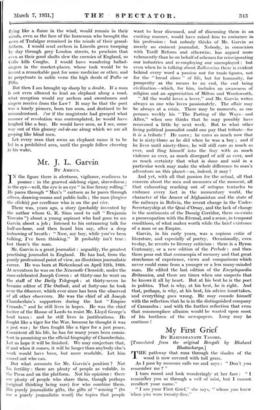Mr. J. L. Garvin
BY AmICUS.
IN the figure there is alertness, vigilance, readiness to pounce : in the gnawed sidelong cigar, shrewdness ; in the eye—well, the eye is an eye " in fine frenzy rolling." He paces through " Max's " cartoon as he paces through offices, drawing-rooms and public halls ; the man (forgive the cliches) par excellence who is on the qui vive.
There was, years ago, a story (probably invented by the author whom G. R. Sims used to call " Benjamin Trovato ") about a young aspirant who had gone to see Garvin about a job ; listened to his entrancing talk for half-an-hour, and then heard him say, after a deep indrawing of breath : " Now, my boy, while you've been talking, I've been thinking." It probably isn't true : but there's the man.
Mr. Garvin is a great journalist : arguably, the greatest practising journalist in England. He has had, from the purely professional point of view, an illustrious journalistic career. He was born at Birkenhead on April 12th, 1868. At seventeen he was on the Newcastle Chronicle, under the once-celebrated Joseph Cowen : at thirty-one he went on the staff of the Daily Telegraph : at thirty-seven he became editor of The Outlook, and at forty-one he took over the Observer, which ever since has been the observed of all other observers. He was the chief of all Joseph Chamberlain's supporters during the last " Empire Crusade," and he still lives in hopes. He was the chief inciter of the House of Lords to resist Mr. Lloyd George's land taxes : and he still lives in justifications. He fought like a tiger for the War, because he thought it was a just war ; he then fought like a tiger for a just peace. Consistent all his life, he has for many years been consis- tent in promising us the official biography of Chamberlain. Let us hope it will be finished. We may conjecture that, if and when it comes, it will be longer than anybody else's work would have been, but more readable. Let him cancel 'out who can.
But what accounts for Mr. Garvin's position ? Not his fertility : there are plenty of people as' voluble, in the Press and on the platform. Not his opinions : there are plenty of people who share thein, though perhaps (original thinking being rare) few who combine them. His purely journalistic gifts, the gifts " sensing " (to Use a Purely journalistic word) the topics that people want to hear discussed, and of discussing them in an exciting manner, would have raised him to eminence in his profession: but nobody thinks of Mr. Garvin as merely an eminent journalist. Nobody, in connexion with Tariff Reform and otherwise, has argued more vehemently than he on behalf of schemes for reinvigorating our industries and re-employing our unemployed : but even when he is talking about Zollvereins there is evident behind every' word a passion not for trade-figures, not for the " bread alone " of life, but for humanity, for prosperity as the means to an end, the end being civilization—which, for him, includes an awareness of religion and an appreciation of Milton and Wordsworth.
" All the world loves a lover," and Mr. Garvin writes always as one who loves passionately. The affair may be always at a crisis. There may be moments, as one peruses weekly his " The Parting of the Ways—and -After," when one thinks that he may possibly have recovered a little by next week. But to what other -living political journalist could one pay that tribute—for it is a tribute ? He cares ; he cares as much now that he is sixty-three as he did when -he was a boy ; and if he lives until ninety-three, he will still care as much as ever, and fling himself into the fray with as much violence as ever, as much disregard of self as ever, and as much certainty that what is done and said in a particular week may make the whole difference to man's adventure on this planet—as, indeed,' it may !
And yet, with all that passion for the actual, all that concern about the men and measures of the moment, all that exhausting reaching out of octopus tentacles to embrace every fact in the momentary world, the character 'of the Ameer of Afghanistan and the state of the railways in Bolivia, the recent change in the Under- Secretaryship at the Quai d'Orsay, and the lack of change in the sentiments of the Danzig Corridor, there co-exists a preoccupation with the Eternal, and a sense, in temporal conditions, of what makes worth while the brief existence of a man or an Empire.
Garvin, in his early years, was a copious critic of literature, and especially of poetry. Occasionally, even to-day, he reverts to literary criticism : there is a Byron Centenary, or a new edition of the Prelude : and then there pour out that cornucopia of memory and that great storehouse of experience, views and comparisons which never could come from a younger or a less many-minded man. He edited the last edition of the Encyclopaedia Britannica, and there are times when one suspects that he knows it all by heart. But at his best he is the poet in politics. That is why, at his best, he is right. And that, perhaps, is why, at his best, his advice isnot taken, and everything goes wrong. He may console himself with the reflection that he-is in the distinguished company of Cassandra : and with the further reflection that even 'that commonplace allusion would be wasted upon most of his brethren of the newspapers. Long may he continue !


























































 Previous page
Previous page